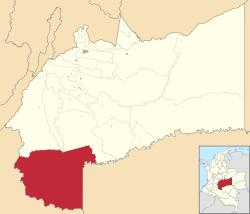La Macarena, Meta
La Macarena is a town and municipality in the Meta Department, located about 280 km (170 m) south of Bogotá, Colombia.
La Macarena, Meta | |
|---|---|
Municipality and town | |
.svg.png) Flag | |
 Location of the municipality and town of La Macarena, Meta in the Meta Department of Colombia. | |
| Country | |
| Department | Meta Department |
| Founded | November 1954 |
| Government | |
| • Mayor | Ismael Medellin Duenas |
| Area | |
| • Municipality and town | 11,229 km2 (4,335.54 sq mi) |
| Elevation | 233 m (764 ft) |
| Population (2015) | |
| • Municipality and town | 32,861 |
| • Urban | 4,458 |
| Time zone | UTC-5 (Colombia Standard Time) |
| Climate | Am |
| Official Website[1] | |
The town was included in the former El Caguan DMZ. Now, back in the control of Colombian Army and Police Force, the town is a growing Ecotourism destination particularly the five coloured river Caño Cristales considered one of the most beautiful in the world. La Macarena is served by La Macarena Airport.
Unidentified corpses and allegations of a mass grave
In January 2010, El Nuevo Herald reported that local villagers had announced the discovery of a mass grave allegedly containing almost 2,000 unidentified corpses in the La Macarena cemetery, apparently containing bodies that had been taken there by the Colombian Army and presented as guerrilla combat casualties. Villagers interviewed by the newspaper suspected that relatives who had previously disappeared during the last few years would have been buried at the site and denied that they were guerrillas. Colombian officials and prosecutors called for further inquiries into the matter. The Inspector General sent investigators into the area and the Attorney General's Office announced an additional probe.[2]
In August 2010, Tribune Magazine reported that an international delegation made up of politicians, lawyers and labor unionists led by the UK-based Justice for Colombia NGO visited the site to take part in a public hearing. According to Justice for Colombia, locals provided reports and evidence of extrajudicial killings by the Colombian military. Colombian President Álvaro Uribe rejected the delegation's presence and accused its members of slandering the Colombian Army.a[3]
In September 2010, the Office of the United Nations High Commissioner for Human Rights visited the La Macarena site and confirmed 446 unidentified bodies that had been reported as guerrillas killed in combat since 2002 were buried in a graveyard but did not find signs of a mass grave nor of any clandestine burials. A report by UN officials called for the identification of the bodies and confirming whether or not human rights violations had been committed. The Office of the High Commissioner for Human Rights expressed its concerns "about the lack of effective controls and adequate records regarding reports of people killed in combat, which raises questions about the circumstances surrounding their deaths." The Colombian Defense Ministry acknowledged the UN's findings and stated that it would support any subsequent investigations.[4]
References
- http://www.iprc.org.co, Equipo de Internet para la Rendición de Cuentas -. "Sitio web del municipio La Macarena en Meta". www.lamacarena-meta.gov.co.
- Herald, GONZALO GUILLÉN / E. Nuevo. "Hallan fosa común con cerca de 2,000 cadáveres en el oriente de Colombia". elnuevoherald.
- "tribunemagazine.co.uk". www.tribunemagazine.co.uk.
- UNHCHR: 446 unidentified bodies buried in Meta graveyard
External Links
| Wikimedia Commons has media related to La Macarena, Meta. |
| Wikivoyage has a travel guide for La Macarena. |